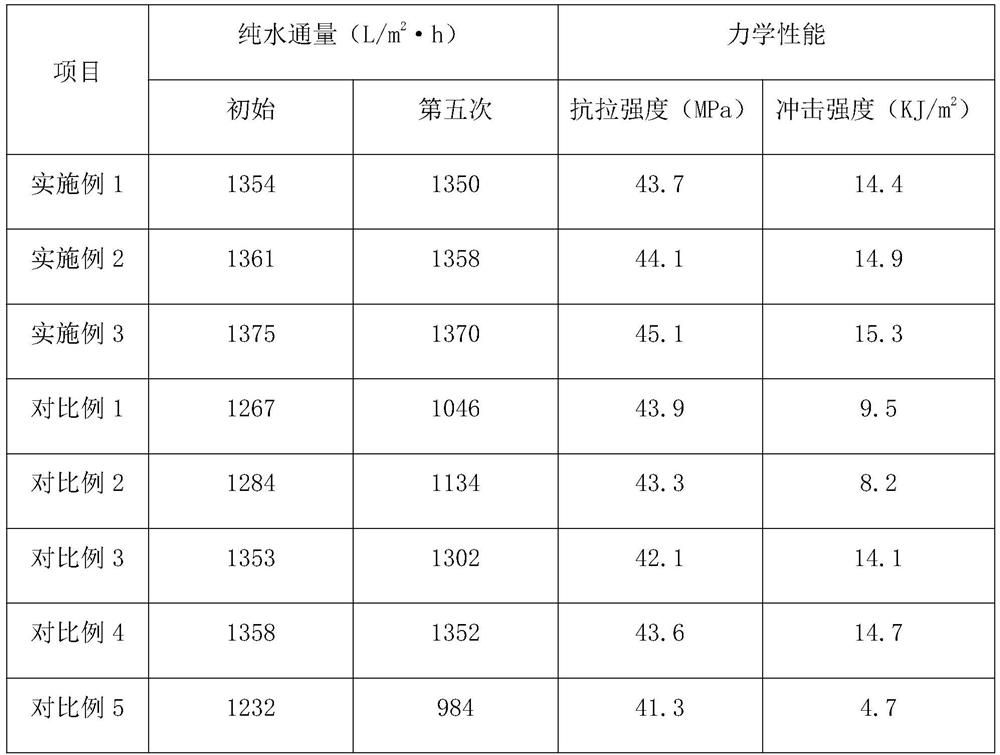Anti-pollution modified polyvinyl chloride composite membrane and preparation method thereof
A polyvinyl chloride and composite membrane technology, applied in the field of composite membranes, can solve the problems of membrane permeability and interception rate decrease, water resource loss of use function, etc., to improve anti-pollution ability, help to deal with water system impact, and good anti-pollution The effect of compressive strength
- Summary
- Abstract
- Description
- Claims
- Application Information
AI Technical Summary
Problems solved by technology
Method used
Image
Examples
Embodiment 1
[0049] (1) Preparation of the first functional layer:
[0050] Take 1 part of carboxymethyl cellulose and add pure water to make carboxymethyl cellulose solution; take aluminum hydroxide and add pure water and polyethylene glycol, add nitric acid after heating up, stir to make alumina sol, add carboxymethyl cellulose plain solution, 0.5 part of glycerin, 1 part of titanium dioxide, and stir evenly to obtain modified alumina, wherein 4 parts of alumina;
[0051] Take 100 parts of polyvinyl chloride and add N,N-dimethylacetamide to dissolve, add 8 parts of vinyl caprolactam, cuprous chloride, pentamethyldipropylenetriamine in a nitrogen atmosphere, and place at a temperature of 70 ° C Carrying out the reaction to obtain modified polyvinyl chloride;
[0052] Dissolve modified polyvinyl chloride in N,N-dimethylacetamide, add modified alumina and 3 parts of sorbitan polyoxyethylene ester, co-extrude the film, and perform single-sided coating on the upper surface of the film body. ...
Embodiment 2
[0067] (1) Preparation of the first functional layer:
[0068] Take 2 parts of carboxymethyl cellulose and add pure water to make carboxymethyl cellulose solution; take aluminum hydroxide, add pure water and polyethylene glycol, add nitric acid after heating up, stir to make alumina sol, add carboxymethyl cellulose plain solution, 1 part of glycerin, 1.5 parts of titanium dioxide, and stir evenly to obtain modified alumina, wherein 7 parts of alumina;
[0069] Take 100 parts of polyvinyl chloride and add N,N-dimethylacetamide to dissolve, add 24 parts of vinyl caprolactam, cuprous chloride, pentamethyldipropylene triamine in a nitrogen atmosphere, and place at a temperature of 70°C Carrying out the reaction to obtain modified polyvinyl chloride;
[0070] Dissolve modified polyvinyl chloride in N,N-dimethylacetamide, add modified alumina and 4 parts of sorbitan polyoxyethylene ester, co-extrude the film, and perform single-sided coating on the upper surface of the film body. ...
Embodiment 3
[0085] (1) Preparation of the first functional layer:
[0086] Take 3 parts of carboxymethyl cellulose and add pure water to make carboxymethyl cellulose solution; take aluminum hydroxide and add pure water and polyethylene glycol, add nitric acid after heating up, stir to make alumina sol, add carboxymethyl cellulose Plain solution, 1.5 parts of glycerin, 2 parts of titanium dioxide, stir evenly, make modified alumina, wherein 10 parts of alumina;
[0087] Take 100 parts of polyvinyl chloride and add N,N-dimethylacetamide to dissolve, add 40 parts of vinyl caprolactam, cuprous chloride, pentamethyldipropylene triamine in a nitrogen atmosphere, and place at 70°C Carrying out the reaction to obtain modified polyvinyl chloride;
[0088] Dissolve modified polyvinyl chloride in N,N-dimethylacetamide, add modified alumina and 5 parts of sorbitan polyoxyethylene ester, co-extrude the film, and perform single-sided coating on the upper surface of the film body. Heating at 120°C, sp...
PUM
 Login to View More
Login to View More Abstract
Description
Claims
Application Information
 Login to View More
Login to View More - R&D
- Intellectual Property
- Life Sciences
- Materials
- Tech Scout
- Unparalleled Data Quality
- Higher Quality Content
- 60% Fewer Hallucinations
Browse by: Latest US Patents, China's latest patents, Technical Efficacy Thesaurus, Application Domain, Technology Topic, Popular Technical Reports.
© 2025 PatSnap. All rights reserved.Legal|Privacy policy|Modern Slavery Act Transparency Statement|Sitemap|About US| Contact US: help@patsnap.com

